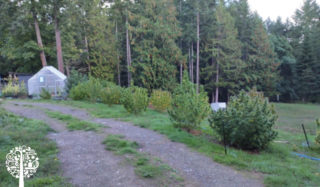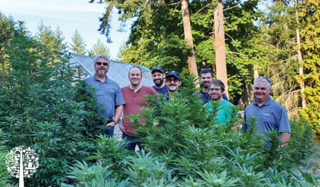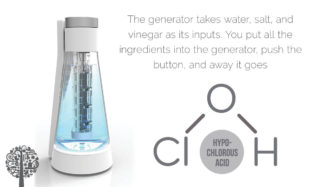I am fortunate to live in one of the most beautiful places in the world for growing outdoor cannabis. Our outdoor hemp (let’s call it CBD flower, as they are new hybridized strains between traditional THC cannabis and industrial hemp) license is located on Galiano, a small island off the West Coast of Canada. We have a great growing season in which we can start early and finish late. However, we still have some common pests and various problems, such as powdery mildew that develop on outdoor plants in an uncontrolled environment. We need a simple solution that we can apply to our plants to help them along. We also need a spray to use until the week before harvest without much risk to our buds. Growing the new hybridized CBD strains, we only focus on getting smokable CBD flower with a fantastic terpene profile to follow. We are fortunate because we accomplished that goal.
A Three-Pronged Approach
We believe the key to our success is threefold. An incredible super soil (the add water variety) from a new company on Galiano; plenty of care and attention to spot problems when they first develop; and hypochlorous acid. Before our CBD flower run, I had never heard of hypochlorous acid, and after my friend Randy Flemming (AKA the ‘Pot Whisper’) mentioned it to me, we had to try it. A quick online shopping spree (+-$200), and the next thing you know, we had a hypochlorous acid generator on our doorstep. We dove into this headfirst and never looked back.
The Hypochlorous Acid Generator
The hypochlorous acid generator came assembled and ready to use. It was reasonably affordable to buy and even cheaper to operate. Remember, I’m not a scientist, so I had to lean on a few people to understand this process. The generator takes water, salt, and vinegar as its inputs. You put all the ingredients into the generator, push the button, and away it goes. Through electrolysis, it rearranges the composition of the water and ends up as hypochlorous acid. It is super easy, and man, it works great.
Hypochlorous acid works by oxidizing the problem areas of the plant and generally seems to leave the bud completely unaffected. We used this treatment twice a week and certainly did not hold back spraying. Of course, a few of the plants weren’t perfect, but for a 100-plant test batch, we were sold.
Growing Pains
Our crop suffered from some powdery mildew, aphids, mites, and more. The hypochlorous acid did its job incredibly well. In some cases, the powdery mildew seemed to be completely killed off, and in other cases, it was like a spot treatment. We sprayed the plant, and the next day could see the scar on the leaf where the mildew used to be. Usually, the plant would spend the next one or two weeks free of powdery mildew. The acid did an even better job controlling the aphids and mites. As you spray the plants, you see how much the bugs hate it in real time. The aphids try to eject themselves off the plant, mites start spinning on the spot, and all the other miscellaneous outdoor pests evacuate just as quickly. Again, the best part is that the bud did not seem to care at all that we were spraying. After the treatments, we could not find any residue, bad smells, or anything else strange with our plants. I will never grow outdoors again without having a generator on hand.

A Few Kinks
Of course, not everything is perfect with hypochlorous acid. While our outdoor plants handled it well, you could tell when you over-sprayed an indoor plant. The oxidation will affect plant leaves if they are not rinsed. I believe that we didn’t experience over-oxidation on the outdoor leaves as we are located on the ‘WetCoast’ of Canada, and our plants got a regular rinse with rain. Using hypochlorous acid at half strength more often seems to be a much better approach for indoor crops. I should also note that while we killed quite a few indoor leaves, we still finished with gorgeous flower and we would still spot-treat any problems while in that growth stage. We typically spray approximately 500PPM on the outdoor plants and a lower PPM now on the indoor grow. The generator isn’t an exact PPM number, so play with the run time and see how the change in PPM affects each potential problem on your plants.
I understand that in Canada, hypochlorous acid is not a registered pesticide. Therefore, a workaround may be needed for any producer that must record their inputs, such as regulated cannabis facilities. Perhaps a registered producer may consider calling it a foliar feed and highlight the importance of ‘Cl’ as an essential nutrient for plant growth and health.
Words Of Advice
Any home and commercial grower should give a hypochlorous acid a shot. It’s cost-effective, easy, environmentally friendly, and most of all, it works. Remember to walk and not run with it on day one, or you will likely overdo it!

